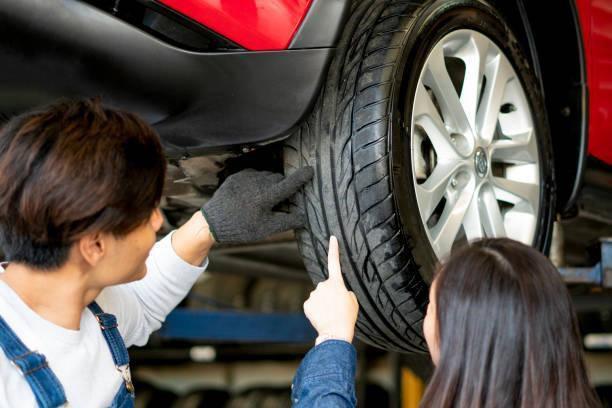
Your car's wheels endure daily impacts from potholes, curbs, and other road hazards. This constant exposure to rough conditions means your wheels require proper care and maintenance to keep them in good shape. The following tips can help extend the life of your car's wheels for years.
Frequently Inspect Wheels for Damage
Regular inspection is crucial for the longevity of your car wheels. Here are some items you should check frequently:
- Tire Pressure: Ensure your tires are inflated to the manufacturer’s recommended levels to prevent uneven wear and potential damage.
- Cracks and Dents: Look for any visible cracks, dents, corrosion, or deformities in the wheel rims, which can indicate damage from potholes or curbs.
- Tread Depth: Check your tires’ tread depth to ensure they have enough grip and wear evenly across all wheels.
Rotate Tires Every 5,000-6,000 Miles
Rotating tires regularly distributes wear evenly, maximizing their life. Have your mechanic rotate and inspect your tires every 5,000-6,000 miles. This practice helps maintain balanced handling and traction and maximizes your tire investment.
Balance Wheels After Tire Work
Unbalanced wheels lead to vibrations and uneven wear; therefore, balancing is essential following new tire installations, rotations, or removals. This process guarantees smooth rides and extends tire longevity.
Frequently Check and Correct Alignment
Improper alignment causes tires to drag and wear unevenly. Your wheels may be misaligned if you notice pulling, vibrations, or uneven tread depths. Regular inspection by a technician can extend tire life and reduce the need for premature replacements.
Know When It's Time for New Wheels
While maintenance helps, wheels will eventually need replacing. Aside from the tips given above, here are other signs that will tell you it’s time to buy a new set of tires:
- Vibration or Wobbling: If you notice persistent vibrations or wobbling while driving, your wheels or tires may be due for a replacement. This can indicate unbalanced tires, worn-out wheel bearings, misaligned wheels, or internal damage to the tires, such as separation of layers or belt issues.
- Uneven Wear Patterns: Check for uneven wear patterns on your tires. These can indicate alignment issues, suspension problems, or the need for tire replacement. Recognizing these signs early helps determine when to replace your car's wheels for improved performance.
- Age of Tires: If your tires are older than 6-10 years, consider replacing them. Even if they appear to have sufficient tread depth, rubber deteriorates over time, potentially compromising safety and performance.
Ensure the Longevity of Your Car Wheels Today
Minor issues with your car's wheels can escalate into significant problems if neglected. Watching for signs of deterioration and knowing when to replace your tires are crucial for a secure driving experience. Being proactive about tire maintenance allows for assured handling and extends the lifespan of your vehicle's vital parts. For durable, high-quality options and expert tire installation, contact Liskey’s Auto and Truck Service.
